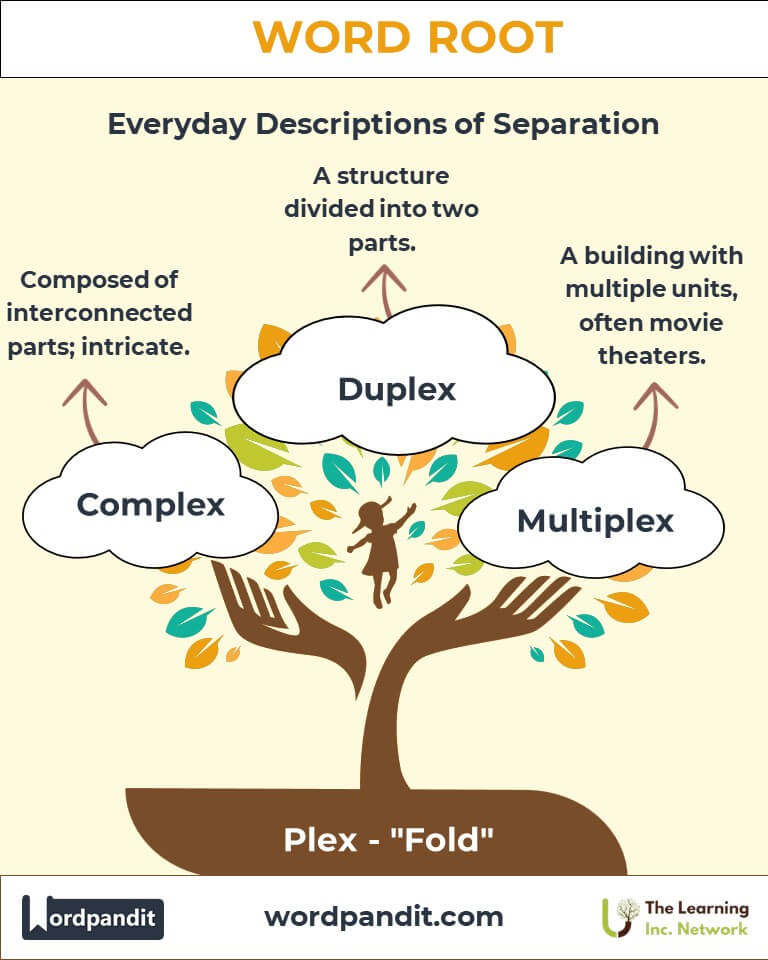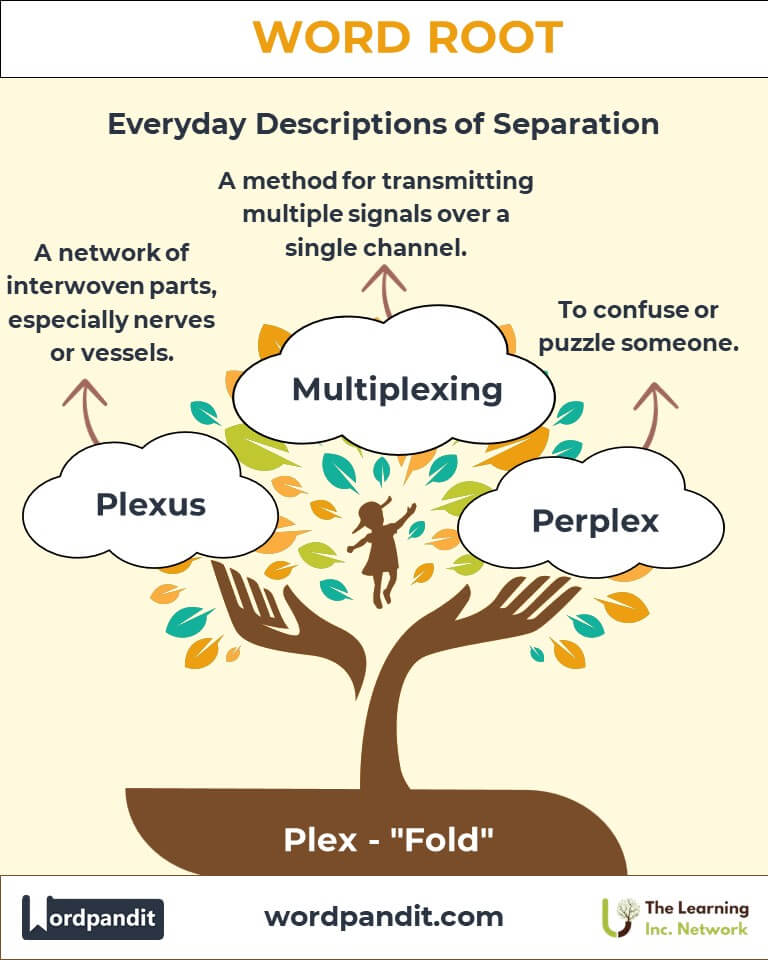Plex: The Root of Complexity and Connection
Discover how the root "plex," meaning "fold," weaves its significance into the fabric of language, from everyday expressions to specialized fields. Words like "complex" and "perplex" demonstrate the root's intricate applications, revealing its role in depicting intricacy, connections, and challenges.

Table of Contents
- Introduction: The Essence of "Plex"
- Etymology and Historical Journey
- Mnemonic: Unlocking the Power of "Plex"
- Common "Plex"-Related Terms
- "Plex" Through Time
- "Plex" in Specialized Fields
- Illustrative Story: "Plex" in Action
- Cultural Significance of "Plex"
- The "Plex" Family Tree
- FAQs about the "Plex" Word Root
- Test Your Knowledge: "Plex" Mastery Quiz
- Conclusion: The Living Legacy of "Plex"
1. Introduction: The Essence of "Plex"
The root "plex" (pronounced pleks) stems from the Latin word plectere, meaning "to fold." It conveys ideas of weaving, intertwining, and combining, forming the foundation of terms that describe complexity, entanglement, and intricate designs. From simple folds to complex systems, "plex" shapes our understanding of the multifaceted nature of the world.

2. Etymology and Historical Journey
The root "plex" originates from the Latin plectere, meaning "to fold, weave, or braid." Over time, it evolved into terms like "complexus" (Latin for interwoven) and found its way into Middle English and modern English. Historical usage reveals "plex" as central to describing intricate patterns, both physical and metaphorical.
3. Mnemonic: Unlocking the Power of "Plex"
Imagine a detailed origami figure, each fold (or "plex") representing a step toward creating something complex and beautiful. The folds intertwine, just like the root "plex" connects elements to form intricate systems.
Mnemonic Device: "Plex folds life into complexity, weaving connections into every detail."
4. Common "Plex"-Related Terms
- Complex (kom-pleks): Composed of interconnected parts; intricate.
Example: "The complex machinery required skilled engineers for assembly." - Perplex (per-pleks): To confuse or puzzle someone.
Example: "The enigmatic riddle continued to perplex the students." - Duplex (doo-pleks): A structure divided into two parts.
Example: "The family moved into a cozy duplex on the city outskirts." - Multiplex (muhl-ti-pleks): A building with multiple units, often movie theaters.
Example: "We watched the latest blockbuster at the multiplex downtown." - Plexus (plek-suhs): A network of interwoven parts, especially nerves or vessels.
Example: "The doctor explained the role of the brachial plexus in arm movement."
5. "Plex" Through Time
- Complexus: Early usage in Latin meant "intertwined" or "embraced." Shifted to English as "complex," emphasizing intricacy.
- Plexus: Used in medical Latin to describe networks, particularly in anatomy.
- Multiplex: Emerged in the late 20th century to denote movie theaters with multiple screens.
6. "Plex" in Specialized Fields
- Medicine:
Term: Plexus
Relevance: Refers to networks of nerves or blood vessels, such as the "solar plexus." - Architecture:
Term: Duplex
Impact: Used to describe a two-unit residential structure. - Technology:
Term: Multiplexing
Significance: A method for transmitting multiple signals over a single channel.
7. Illustrative Story: "Plex" in Action
A young architect named Mia was tasked with designing a multiplex theater that catered to diverse audiences. Inspired by the root "plex," she envisioned the building as a folded structure, symbolizing interwoven paths. Her design won accolades for its innovative integration of form and function, demonstrating how the essence of "plex" creates harmony from complexity.
8. Cultural Significance of "Plex"
The root "plex" embodies humanity’s fascination with complexity and interconnection. From intricate art forms to scientific breakthroughs, it highlights our ability to create, navigate, and appreciate systems that go beyond simplicity. Cultural expressions like "complex characters" in literature further illustrate its profound impact.

9. The "Plex" Family Tree
- Flex (to bend): Flexible, Reflex
- Text (to weave): Textile, Context
- Plic (to fold): Complicate, Explicit

FAQs About the "Plex" Word Root
Q: What does "plex" mean?
A: "Plex" means "fold" or "intertwine," originating from Latin. It is used to describe intricate, interconnected systems or elements.
Q: How is "plex" used in anatomy?
A: In anatomy, "plex" appears in terms like "nerve plexus," referring to networks of interwoven nerves or vessels, such as the brachial plexus.
Q: What is a "duplex" in architecture?
A: A "duplex" is a two-unit residential structure, often sharing a common wall, reflecting the "folding" or joining of two parts into one.
Q: How does "plex" relate to technology?
A: In technology, "plex" is central to terms like "multiplexing," which involves transmitting multiple signals over a single channel.
Q: What does "perplex" mean?
A: "Perplex" means to confuse or puzzle someone, derived from the Latin "perplexus," meaning "entangled" or "complex."
Test Your Knowledge: "Plex" Word Root Quiz
1. What does the root "plex" signify?
2. Which term describes a two-unit residential structure?
3. What does "plexus" refer to in anatomy?
4. What does "multiplex" commonly refer to?
5. What does "perplex" mean?
12. Conclusion: The Living Legacy of "Plex"
The root "plex" reveals the beauty of folds and connections, enriching language and thought across disciplines. Its legacy lies in illustrating how complexity and simplicity coexist, from the elegance of an origami fold to the intricacy of a neural plexus. Embrace the "plex" in your world—where complexity meets creativity.












